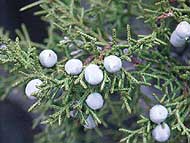Juniper Berries

Juniper berries, also known by the names Juniper Bush and Juniper Bark, are found on the evergreen juniper shrub, which grows widely throughout the Northern Hemisphere. New berries appear on mature trees in the fall, and by spring they ripen to blue. Because the berries take between two to three years to fully ripen, the same plant can have unripe green and ripe blue berries at the same time.
Traditionally, juniper was used as a diuretic and to treat problems of the kidneys and bladder. Tea made from juniper berries was recommended to ward off cystitis and other urinary tract infections.
“I think juniper does contain urinary antiseptics, although bayberry and cranberry are more famous for that,” says Dr. James A. Duke, Ph.D., a botanist and toxicology specialist with the U.S. Department of Agriculture in Beltsville, Maryland.
According to The Prevention How-To Dictionary of Healing Remedies and Techniques, a survey of the herbal literature suggests juniper, while effective, may be too dangerous for unsupervised use: “For one thing, it stimulates uterine contractions that would be hazardous for expectant mothers. And while juniper may work as a diuretic, it also stimulates the kidneys. That’s bad news for someone who already has kidney problems.”
According to the editors of Herbal Medicine Past and Present, using juniper as a healing agent is, in many instances, “hardly prudent in the light of the availability of less toxic products.”
|